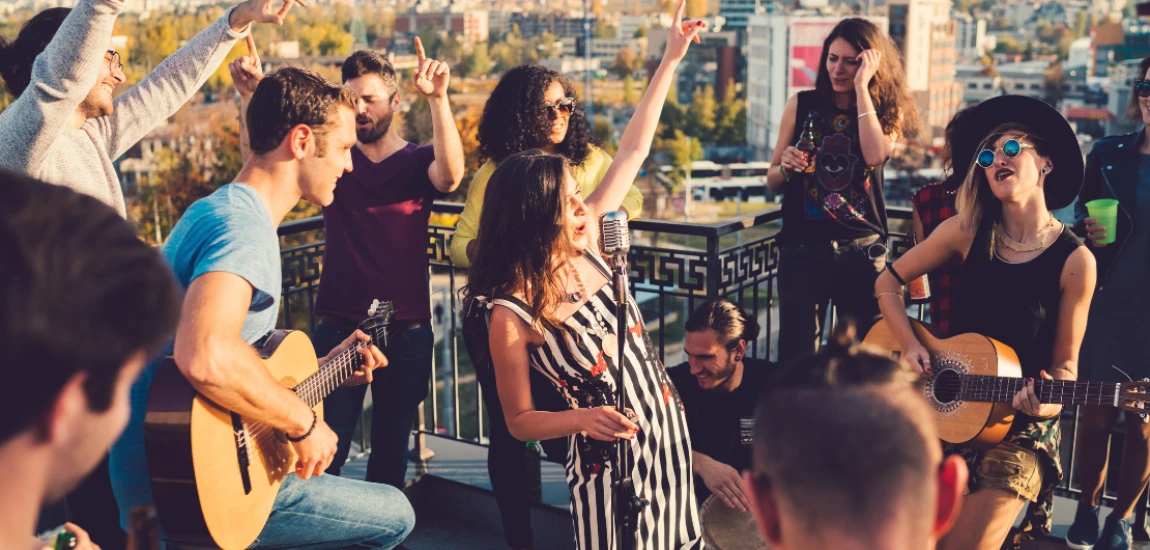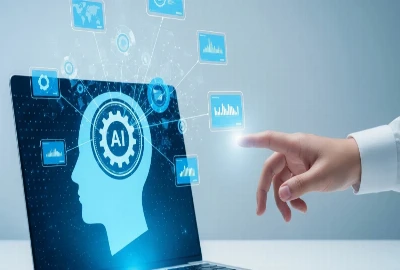The Role of AI as Co-Creator in Music Composition, Lyrics & Live Performance

Music has always evolved alongside technology. From the invention of the phonograph to digital synthesizers and auto-tune, every innovation has changed how music is made and experienced. Today, artificial intelligence (AI) has moved beyond being just a production tool. It is stepping into the role of co-creator, capable of writing melodies, suggesting lyrics, and even performing alongside musicians on stage.
Unlike earlier forms of music technology, which acted like instruments or editing software, AI operates with autonomy and creativity. It can process massive datasets of existing music, identify patterns in rhythm, melody, and emotion, and generate entirely new compositions in seconds. But the story goes deeper than efficiency. AI is pushing boundaries of what “authorship” means in music, and how human musicians define their creative role.
In this blog, we’ll explore how AI is co-creating across composition, lyric writing, and live performance. We’ll also look at the opportunities it brings, the challenges it raises, and what the future of music might sound like in a world where algorithms and artists work hand in hand.
AI in Music Composition: From Background Beats to Symphonies

How AI Composes Music
AI algorithms can analyze thousands of musical pieces across genres, from classical symphonies to electronic beats. Using machine learning models like recurrent neural networks and transformers, AI learns the rules of harmony, rhythm, and melody. It then generates compositions that can mimic styles or invent new ones altogether.
Benefits for Artists and Producers
Speed and Inspiration: A musician facing writer’s block can use AI to generate chord progressions or melodies that spark creativity.
Customization: AI can compose tracks tailored to specific moods or commercial needs, such as ad jingles, film scores, or video game soundtracks.
Accessibility: Independent musicians with limited resources gain access to high-quality compositions without expensive studio time.
Real-World Examples
Companies like Aiva, Amper Music, and OpenAI’s MuseNet are already used by artists and studios. Aiva composes classical music for films and video games, while Amper allows musicians to create royalty-free tracks in minutes. These tools don’t replace composers but augment the creative workflow.
AI in Lyric Writing: From Random Words to Emotional Storytelling

How AI Generates Lyrics
Natural language processing (NLP) enables AI to write lyrics by analyzing vast libraries of existing songs. It learns rhyme schemes, syllable counts, and thematic structures. More advanced models can even adapt to a specific artist’s voice or style, generating lyrics that sound like they came from that artist’s pen.
Creative Use Cases
Collaborative Brainstorming: Songwriters use AI to suggest lines or rhymes when they’re stuck.
Genre Experimentation: AI can generate lyrics across genres, from rap to folk ballads, helping musicians cross stylistic boundaries.
Fan Engagement: Some artists even allow fans to co-create lyrics with AI tools during interactive sessions.
Concerns and Criticism
Critics argue AI-generated lyrics lack the depth of lived experience that human songwriters bring. While AI can mimic style, it struggles with genuine emotion. However, when paired with human oversight, AI becomes less of a threat and more of a creative amplifier.
AI on Stage: Live Performance and Improvisation

AI as a Live Musician
Live music is traditionally about spontaneity and energy. AI challenges this by acting not only as a backing track but as a performing partner. Using real-time data, AI can respond to crowd energy, tempo shifts, or even improvisational cues from human musicians.
AI-Powered Stage Experiences
Visual and Sound Synchronization: AI can sync visuals, lighting, and soundscapes with live music in real time, creating fully immersive performances.
Interactive Concerts: Audiences may influence the direction of a song through apps or sensors, with AI adapting the performance accordingly.
AI DJs: In electronic music, AI systems can mix tracks live, responding to crowd movement or biometrics like heart rate.
Case Studies
Artists like Taryn Southern and YACHT have used AI in live performances. YACHT, for example, trained AI on their past work and performed songs co-written with it, creating a concert experience that blurred the line between human and machine.
The Benefits of AI as a Creative Partner in Music

Breaking Creative Blocks
Musicians often struggle with stagnation. AI’s ability to generate infinite variations of melodies and lyrics provides fresh directions when human inspiration runs dry.
Democratizing Music Creation
AI lowers barriers for entry, allowing hobbyists, students, and independent creators to make professional-quality music without needing advanced training. This could lead to a broader diversity of voices in the music industry.
Expanding Artistic Possibilities
With AI, musicians can experiment with genres they might not normally attempt. For example, a jazz artist might collaborate with AI to produce EDM-inspired tracks, leading to hybrid genres and innovations.
Challenges and Ethical Questions Around AI in Music

Authorship and Ownership
If an AI generates a melody, who owns the copyright—the developer, the musician, or the AI? Current copyright laws are not fully equipped to handle AI co-creation.
Authenticity and Emotion
Music is deeply personal, often reflecting an artist’s lived experiences. Critics worry that AI-generated content may feel soulless or manufactured. The challenge lies in balancing machine efficiency with human authenticity.
Industry Disruption
Producers, songwriters, and session musicians may worry about job displacement. While AI opens new roles in tech-driven creativity, it also raises concerns about undermining traditional music careers.
How Musicians Can Embrace AI Without Losing Their Voice

Treating AI as an Instrument, Not a Replacement
Musicians who thrive with AI view it the same way artists once embraced the electric guitar or digital sampling: a tool that expands possibilities, not one that diminishes artistry.
Developing Hybrid Workflows
Use AI for first drafts of compositions or lyrics, then refine with human intuition.
Integrate AI into live shows as a supporting act, while keeping human improvisation central.
Collaborate with fans using AI-powered interactive experiences to deepen audience connection.
Building Technical Literacy
Artists who understand the basics of AI tools gain more control over how they use them creatively, ensuring AI supports rather than dominates their work.
The Future of Music with AI as Co-Creator

Personalized Music Experiences
In the near future, audiences may listen to songs uniquely generated for them—personalized playlists where melodies and lyrics adapt to mood, time of day, or emotional state.
AI-Driven Genre Innovation
Just as hip-hop emerged from turntables and EDM from digital production, new genres will likely arise from human-AI collaboration. These could combine unexpected cultural and sonic influences.
Towards Human-Machine Symbiosis
Ultimately, the future of music may not be about replacing human creativity but about achieving a symbiosis where AI handles complexity and repetition while humans infuse heart and meaning. This hybrid future could redefine what we call “music” altogether.




